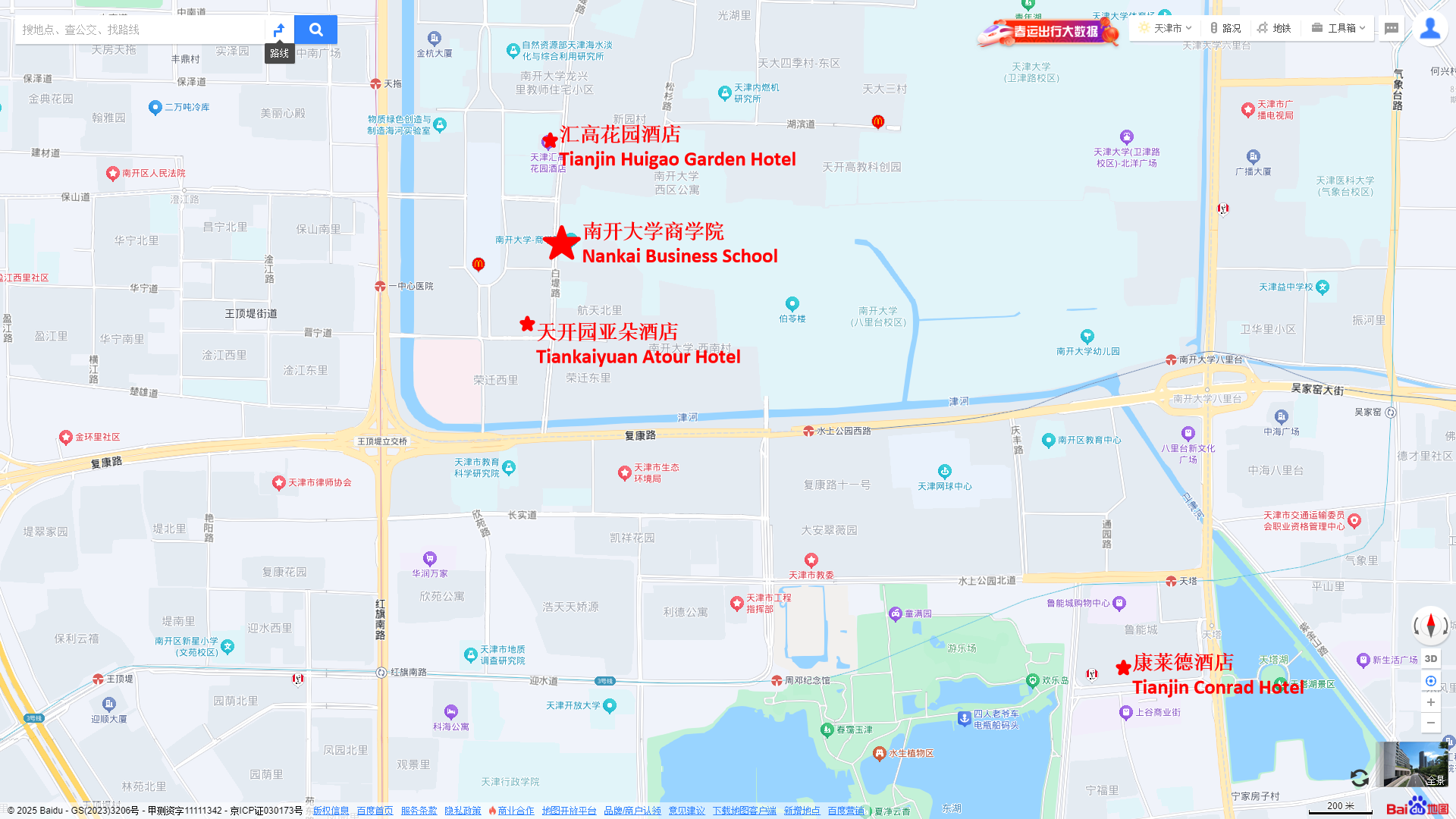
We cordially extend an invitation for paper submissions to the 26th International Conference on Electronic Commerce (ICEC 2025), taking place in Tianjin, China from June 6-8, 2025, in collaboration with Nankai University.
ICEC, a globally acclaimed academic conference since 1998, focuses on the intersection of information technology and management in e-commerce, having been previously hosted in various countries including China, South Korea, Austria, the United States, Netherlands, Singapore, and the United Kingdom.
The guiding theme for ICEC 2025 is “Transforming E-Commerce with AI: Navigating Innovation, Personalization, and Ethical Challenges”. We warmly welcome submissions of original research papers offering fresh insights concerning the theory, design, development, evaluation, and applications in e-commerce. Both research-in-progress papers (as extended abstracts) and completed papers that offer innovative and early-stage research inspirations are appreciated. For conference updates, visit: https://www.tjhongcheng.com/icec2025/120.html
SUGGESTED TOPICS (not limited)
·Technological innovation in E-Commerce: Explore how technologies innovation are transforming the e-commerce industry through advancements such as intelligent artificial (AI), intelligent search engines, dynamic pricing algorithms and chatbot, and virtual try-on experiences. Dive into these technologies transformative role in optimizing supply chains, enhancing inventory management, revolutionizing logistics for growth and innovation in the industry.
·Digital Marketing and Social Commerce: Examine how social media platforms enhance consumer engagement and drive sales by integrating shopping features directly into their interfaces. Analyze the impact of influencer marketing and user-generated content in fostering trust and shaping purchasing decisions.
·Supply Chain and Logistics Management: Explore strategies to improve supply chain efficiency through real-time tracking, automated warehousing, and inventory forecasting. Focus on last-mile delivery innovations like drones and autonomous vehicles to meet consumer demands for fast and reliable shipping. Highlight the importance of sustainable logistics in reducing costs and environmental impact.
·Business Models and Platform Ecosystems: Analyze innovative business models such as subscription services and direct-to-consumer strategies, which provide novel approaches for engaging with customers. Examine the competitive dynamics and collaborative opportunities among platforms, and emphasize the development of creative ecosystems that effectively balance customer satisfaction with sustainable profitability.
·Personalization and Customer Experience with AI: Examine how AI customizes shopping experiences to enhance customer satisfaction and build stronger customer relationships. It emphasizes AI’s ability to enhance customer satisfaction, fosters loyalty, and builds stronger relationships by delivering tailored, user-centric interactions. By transforming traditional shopping into seamless and intuitive experiences, AI boosts engagement and fosters stronger connections with customers.
·AI and Consumer Behavior in E-Commerce: Explore how AI analyzes consumer data to identify behavioral patterns and predict shopping preferences. It focuses on understanding the motivations driving purchasing decisions and highlights how AI delivers actionable insights, enabling businesses to adapt effectively to evolving market dynamics.
·Payment Systems and Financial Technology (FinTech): Explore the role of digital wallets, mobile payments, and blockchain in creating secure and seamless transactions. Study the adoption of cryptocurrencies in e-commerce and their potential impact. Highlight how FinTech innovations address fraud and enhance trust in online transactions.
·Sustainability and Green E-Commerce: Research eco-friendly practices such as green packaging, sustainable logistics, and energy-efficient operations. Explore consumer preferences for environmentally conscious businesses and how these influence buying behavior. Study the role of e-commerce in promoting the circular economy.
·Ethical Implications in AI for E-Commerce: Discuss the ethical challenges of using AI in e-commerce, including algorithmic bias, inclusivity, the ethics of personalized targeting, data privacy, security, and the spread of misinformation in user-generated content and reviews. It highlights the necessity of transparency in AI decision-making to build consumer trust and promote responsible and ethical AI practices.
·Future Trends for E-Commerce: Speculate on future trends and disruptive innovations in AI, such as its integration with the metaverse, advancements in conversational AI, and immersive shopping technologies. Evaluate the potential societal impacts, regulatory challenges, and transformative possibilities that AI brings to the future of commerce.
Selected papers from ICEC 2025 may be invited to contribute to special issues (https://www.icec.net/icec2025/specialissues) of journals such as Information and Management (SCI/SSCI, Elsevier), Data Science and Management (Scopus, Elsevier), Journal of Theoretical and Applied Electronic Commerce Research, and Nankai Business Review International. Presentation at ICEC2025 not only promises a significant publication channel, but also an opportunity to garner constructive feedback and potential collaborators for ongoing research.
PAPER SUBMISSION GUIDELINES
· Submitted papers must contain original work not previously published, or currently under review elsewhere.
· Submissions will be processed through EasyChair:
https://easychair.org/conferences/?conf=icec2025
· All papers must be written in English. A full paper should not exceed 8 pages, including figures and references. A short paper (research-in-progress or extended abstract) is limited within 3 pages. Only full papers will be considered for the invitation to special issues and as candidates for the best paper award. All papers including workshop papers must be submitted through the EasyChair conference submission system.
[Submission Template]
IMPORTANT DATES
· Extended deadline for paper submission: April 15, 2025
· Notification of acceptance: May 5, 2025
· Conference Dates: June 6-8, 2025
CONFERENCE ORGANIZERS
· International Center for Electronic Commerce (https://icec.net)
· Nankai University Tianjin, China
· Korea Intelligent Information Systems Society
HONORARY CHAIRS
· Jae Kyu Lee(jklee@kaist.ac.kr), Professor, Chair Professor of Xi'an Jiaotong University and Professor Emeritus of KAIST
· Changhong Bai(nkbai@nankai.edu.cn), Professor, Dean, Business School, Nankai University
· Gyoo Gun Lim(gglim@hanyang.ac.kr), President, ICEC Center, Professor & Dean, Hanyang University
· Jung Seung Lee(leebahk@gmail.com), President-Elect of Korea Intelligent Information Systems Society (2025), Professor, HoSEo University
CONFERENCE CHAIRS
· Yongjian Li(liyongjian@nankai.edu.cn), Professor, Business School, Nankai University
· Hyung Yong Lee(leemit@hansung.ac.kr), Professor, Hansung University, President-Elect KIISS (2026)
PROGRAM CHAIRS
· Kai Li(likai@nankai.edu.cn), Professor, Associate Dean, Business School, Nankai University
· Gene Moo Lee(gene.lee@sauder.ubc.ca), Professor, University of British Columbia
· Alvin Leung(alvincml@gmail.com), Professor, City University of Hong Kong
· Sung Byung Yang(sbyang@khu.ac.kr), Professor, Business School, Kyunghee University
ORGANIZING CHAIRS
· Yi Wu (yiwu@tju.edu.cn), Associate Professor, College of Management and Economics, Tianjin University
· Xiaofei Zhang (xiaofeizhang@hit.edu.cn), Professor, School of Management, Harbin Institute of Technology
· Mengli Yu (mengliyu@nankai.edu.cn), Associate Professor, School of Journalism and Communication, Nankai University
· Jumin Lee(juminlee@khcu.ac.kr), Professor, Kyunghee Cyber University
· Sai Liang (liangsai@nankai.edu.cn), Professor, College of Tourism and Service Management, Nankai University
· Jian Mou (jian.mou@pusan.ac.kr), Professor, Business School, Pusan National University
SPECIAL ISSUE CHAIRS AND GUEST EDITORS
· Taeho Hong(taeho.hong@gmail.com), President KIISS (2024), Professor, Pusan National University
Information & Management:Bright Internet through Secure and Responsible Artificial Intelligence (http://brightinternet.org/special-issues)
· Alvin Leung(alvincml@gmail.com), Professor, City University of Hong Kong
· Gene Moo Lee(gene.lee@sauder.ubc.ca), Professor, University of British Columbia
Data Science and Management:
· Shan Liu (shanliu@xjtu.edu.cn), Professor, Xi’an Jiaotong University
Nankai Business Review International
· Yi Wu (yiwu@tju.edu.cn), Associate Professor, College of Management and Economics, Tianjin University
· Xiaofei Zhang (xiaofeizhang@hit.edu.cn), Professor, School of Management, Harbin Institute of Technology
· Mengli Yu (mengliyu@nankai.edu.cn), Associate Professor, School of Journalism and Communication, Nankai University
· Sai Liang (liangsai@nankai.edu.cn), Professor, College of Tourism and Service Management, Nankai University
Journal of Theoretical and Applied Electronic Commerce Research
· Kai Li (likai@nankai.edu.cn), Professor, Business School, Nankai University
· Xiaofei Zhang (xiaofeizhang@hit.edu.cn), Professor, School of Management, Harbin Institute of Technology· Yi Wu (yiwu@tju.edu.cn), Associate Professor, College of Management and Economics, Tianjin University
· Sai Liang (liangsai@nankai.edu.cn), Professor, College of Tourism and Service Management, Nankai University
· Mengli Yu (mengliyu@nankai.edu.cn), Associate Professor, School of Journalism and Communication, Nankai University
PROGRAM COMMITTEE
· Donghyuk Shin(dhs@kaist.ac.kr), Associate Professor, KAIST
· Dongwon Lee(dongwon@ust.hk), Associate Professor, HKUST
· Myunghwan Lee(myunghwanlee@cuhk.edu.hk), Assistant Professor, Chinese University of Hong Kong
· Wooje Cho(woojecho@snu.ac.kr), Associate Professor, Seoul National University
· Jiyong Park(jiyong.park@uga.edu), Assistant Professor, University of Georgia
· Yoonseok Son(yson@nd.edu), Assistant Professor, University of Notre Dame
· Miyeon Jung(miyeon.jung@unlv.edu), Assistant Professor, University of Nevada Las Vegas
· Hyeokkoo Eric Kwon(eric.kwon@ntu.edu.sg), Assistant Professor, Nanyang Technological University
· Martin Kang(martin.kang@lmu.edu), Assistant Professor, Loyola Marymount University
· Pan Li(pan.li@scheller.gatech.edu), Assistant Professor, Georgia Institute of Technology
· Guohou Shan(g.shan@northeastern.edu), Assistant Professor, Northeastern University
· Yifan Yu(Yifan.Yu@mccombs.utexas.edu), Assistant Professor, University of Texas at Austin
· Wilson Li(wilson.li@deakin.edu.au), Lecturer, Deakin University
· Amanda Chu(amandachu@eduhk.hk), Assistant Professor, The Education University of Hong Kong
· Anik Mukherjee(anik.mukherjee@iimcal.ac.in), Assistant Professor, Indian Institute of Management, Calcutta
· Tianjian Zhang(tzhang@csudh.edu), Assistant Professor, California State University, Dominguez Hills
· Thi Tran(ttran9@binghamton.edu), Assistant Professor, Binghamton University
· Hong Joo Lee(hongjoo@catholic.ac.kr), Catholic University
· OhByung Kwon(obkwon@khu.ac.kr), Kyunghee University
· Jae Won Choi(jaewonchoi@sch.ac.kr), Soonchunhyang University
· JongWook Choi(juchoi@markany.com), Institute of Technology at Bandung & MarkAny
· Lou Liguo(alexlou87@hotmail.com), Ningbo University of Technology
· Ju Young Kang(jykang@ajou.ac.kr), Ajou University
· Sung Bum Park(parksb@hoseo.edu ), HoSeo University
· Jung Hun Lee(jhoonlee@yonsei.ac.kr), Yonsei University
· Younghoon Chang(younghoonchang@bit.edu.cn), Beijing Institute of Technology
· Dong Yeon Kim(dykim88@hanyang.ac.kr), Hanyang University
· Daegon Cho(daegon.cho@yonsei.ac.kr), Yonsei University
· SeungIk Baek(sbaek@hanyang.ac.kr), Hanyang University
· HyunChul Ahn(hcahn@kookmin.ac.kr), Kookmin University
· Namkyu Kim(ngkim@kookmin.ac.kr), Kookmin University
· Yu DeungSeung(yudengsheng@outlook.com), Wenzhou University of Techonology
· Jun Seok Hong(junehong@kyonggi.ac.kr), Kyonggi University
· Mou Jian(jian.mou@pusan.ac.kr), Pusan National University
· Spring H. Han(han.hyunjeong.8r@kyoto-u.ac.jp ), Kyoto University
· Hyejung Lee (hlee@rs.tus.ac.jp), Tokyo University of Science
· Chulmo Koo(heltmetgu@khu.ac.kr), Kyung Hee University
· Sohyeong Kim(sohkim@stanford.edu), Stanford University
· One-Ki Lee(leeo@vcu.edu), Virginia Commonwealth University
· Yun Joo Park(yjpark@seoultech.ac.kr), Seoul University of Science and Technology
· Mye Sohn(myesohn@skku.edu), Sungkyunkwan University
· Youngseok Bang(yb@yonsei.ac.kr), Yonsei University
· Kyung Jin Cha(kjcha7@hanyang.ac.kr ), Hanyang University
· Woo Jun Kim(wkim@yonsei.ac.kr ), Yonsei University
· Sang-Hyeak Yoon(yoonsh@koreatech.ac.kr), KoreaTECH
· Zhaohua Deng(zh-deng@hust.edu. cn), Huazhong University of Science and Technology
· Baojun Gao(gaobj@whu.edu.cn), Wuhan University
· Guoyin Jiang(jiangguoyin@uestc.edu.cn), University of Electronic Science and Technology of China
· Xing Zhang(zhangxing1981@126.com), Wuhan Textile University
· Xiaoxiao Liu(xiaoxiaoliu@xjtu.edu.cn), Xi'an Jiaotong University
· Xiang Gong(xianggong@nwpu.edu.cn), Northwestern Polytechnical University
· Wei Zhao(wei.zhao@xjtu.edu.cn), Xi'an Jiaotong University
· Yang Liu(liuyang.alison@xjtu.edu.cn), Xi'an Jiaotong University
· Quan Xiao(xiaoquan@foxmail.com), Jiangxi University of Finance and Economics
· Yongqing Yang(yyq.name@aliyun.com ), Shandong Technology and Business University
· Hongyi Mao(mao@mail.gufe.edu.cn), Guizhou University of Finance and Economics
· Ligang Cui(cligang@126.com), Chongqing Jiaotong University
· Tailai Wu(wutailai@hust.edu.cn), Huazhong University of Science and Technology
· Xiaosong Wu(xiaosongw@outlook.com), Beijing Normal University
· Yujuan Zheng( zhengyujuan@xidian.edu.cn ), Xidian University
· Hao Wang(wangh_1996@outlook.com), Central China Normal University
· Kezhen Wei(kezhenw001@swufe.edu.cn), Southwestern University of Finance and Economics
· Guangsen Si(guangsensi@163.com), Zhengzhou University
· Feng Liu(liufeng@sdu.edu.cn), Shandong University
· Chao Fang(fangchao@xjtu.edu.cn), Xi'an Jiaotong University
· Le Wang(wangle@xjtu.edu.cn), Xi'an Jiaotong University
· Zhaojin Li(lizhaojin0722@xjtu.edu.cn), Xi'an Jiaotong University
· Lin Wang(wanglin982@163.com), Huazhong University of Science and Technology
· Jin Li(jinlimis@xjtu.edu.cn), Xi'an Jiaotong University
· Hui Li, College of Tourism and Service Management, Nankai University
· Sai Liang, College of Tourism and Service Management, Nankai University
· Caiyan Gong, School of Economics and Management, Harbin Engineering University
· Yang Qian, School of Management, Hefei University of Technology
· Kun Yuan, School of Management, Hefei University of Technology
· Xinxin Guo, School of Management, Jiangsu University
· Yuanchun Jiang, School of Management, Hefei University of Technology
· Yezheng Liu, School of Management, Hefei University of Technology
· Ziqiong Zhang, School of Economics and Management, Harbin Institute of Technology
· Shaohui Wu, School of Economics and Management, Harbin Institute of Technology
· Dapeng Pan, Research Center of Cyber Science and Technology, Hangzhou Innovation Institute, Beihang University
· Zhao Cai, Nottingham University Business School China, University of Nottingham Ningbo China
· Meng Chen, School of Management, University of Science and Technology of China
· Mengli Yu, School of Journalism and Communication, Nankai University
· Haiyang Feng, College of Management and Economics, Tianjin University
· Nan Yuan, School of Management Science and Engineering, Tianjin University of Finance and Economics
· Zhongtao Hu, School of Economics and Management, Hebei University of Technology
· Ling Zhao, School of Management, Huazhong University of Science & Technology
· Xin Fu, School of Management, Xiamen University
· Fanbo Meng, School of Business, Jiangnan University
· Shuqing Chen, School of Medicine and Health, Harbin Institute of Technology
· Xiumei Ma, School of Public Administration, Sichuan University
· Xiaochao Wei, School of Economics, Wuhan University of Technology
· Jiang Wu, School of Information Management, Wuhan University
· Chaocheng He, School of Information Management, Wuhan University
· Xusen Cheng, School of Information, Renmin University of China
· Jian Mou, School of Business, Pusan National University
· Alex Zarifis, Southampton Business School, University of Southampton
· JEE HAE LIM, Shidler College of Business, University of Hawaii at Manoa
CONFERENCE LOCATION
· Business School, Nankai University
(https://bs.nankai.edu.cn/en/)
Address: 121 Baidi Road, Tianjin, 300071, China
Conference Secretariat
· Xinyao Yu(ICEC2025@163.com), Nankai Business School
· Jae Ik Ahn(contact@icec.net), ICEC Center
Waived Copyright of ICEC Conference Proceedings
· All submitted papers will be blindly reviewed by peers to decide the acceptance, and the accepted papers must be presented according to its scheduled sessions. The best papers will be selected and awarded, and qualified papers will be invited to the special issues of companion journals of the year.
ICEC certifies the presentations of accepted papers through its proceedings webpage, but does not hold the copyright so that authors can submit their presented papers to journals without any conflict with the publication in the proceedings.
vTimeline | Event | |||
June 6 | 14:00 - 20:00 | On-site Registration opens at Business School | ||
14:00 - 17:00 | Special Workshops | |||
16:00 - 18:00 | ICEC Executive Committee meeting | |||
18:00 - 20:00 | Welcome Reception | |||
June 7 | 09:00 - 09:30 | Opening Ceremony | ||
09:30 - 10:10 | Keynote Speeches: Prof. Chee-Wee Tan: E-Commerce Live Streaming: Differentiation Through Customer Engagement | |||
10:10 - 10:40 | Break and Photo Time | |||
10:40 - 12:00 | Keynote Speeches Prof. Chulmo Koo: AI-Powered Smart Tourism 2.0: A 10-Year Retrospective and Updated Model Prof. Yingjie Zhang: Crowding the Machine: How Large Language Model Popularity Reshapes Profile Screening | |||
| ||||
12:00 - 14:00 | Lunch | |||
14:00 - 14:40 | Panel on AI in E-commerce | |||
14:40 - 15:20 | Panel on Development of AI technologies (Chinese) | |||
15:20 - 15:30 | Announcement of ICEC 2026 in Korea | |||
15:30 - 16:00 | Break & Posters | |||
16:00 - 17:30 | Papers Track A1 | Papers Track B1 | Papers Track C1 | |
18:00 - 20:00 | Banquet and Best Paper Awards | |||
| ||||
June 8 | 08:30 - 09:50 | Keynote Speeches: Prof. Xin Luo A practitioner | ||
09:50 - 10:20 | Break & Posters | |||
10:20 - 12:00 | Panel of Journal Publications and Special Issues | |||
| ||||
12:00 - 14:00 | Lunch | |||
14:00 - 15:00 | Papers Track A2 | Papers Track B2 | Papers Track C2 | |
15:00 - 16:00 | Papers Track A3 | Papers Track B3 | Papers Track C3 | |
16:00 - 16:30 | Break & Posters | |||
16:30 - 17:30 | Papers Track A4 | Papers Track B4 | Papers Track C4 | |
HONORARY CHAIRS
·Jae Kyu Lee(jklee@kaist.ac.kr), Professor, Chair Professor of Xi'an Jiaotong University and Professor Emeritus of KAIST
·Changhong Bai(nkbai@nankai.edu.cn), Professor, Dean, Business School, Nankai University
·Gyoo Gun Lim(gglim@hanyang.ac.kr), President, ICEC Center, Professor & Dean, Hanyang University
·Jung Seung Lee(leebahk@gmail.com), President-Elect of Korea Intelligent Information Systems Society (2025), Professor, HoSEo University
CONFERENCE CHAIRS
·Yongjian Li(liyongjian@nankai.edu.cn), Professor, Business School, Nankai University
·Hyung Yong Lee(leemit@hansung.ac.kr), Professor, Hansung University, President-Elect KIISS (2026)
PROGRAM CHAIRS
·Kai Li(likai@nankai.edu.cn), Professor, Associate Dean, Business School, Nankai University
·Gene Moo Lee(gene.lee@sauder.ubc.ca), Professor, University of British Columbia
·Alvin Leung(alvincml@gmail.com), Professor, City University of Hong Kong
·Sung Byung Yang(sbyang@khu.ac.kr), Professor, Business School, Kyunghee University
ORGANIZING CHAIRS
·Yi Wu (yiwu@tju.edu.cn), Associate Professor, College of Management and Economics, Tianjin University
·Xiaofei Zhang (xiaofeizhang@hit.edu.cn), Professor, School of Management, Harbin Institute of Technology
·Mengli Yu (mengliyu@nankai.edu.cn), Associate Professor, School of Journalism and Communication, Nankai University
·Jumin Lee(juminlee@khcu.ac.kr), Professor, Kyunghee Cyber University
·Sai Liang (liangsai@nankai.edu.cn), Professor, College of Tourism and Service Management, Nankai University
· Jian Mou (jian.mou@pusan.ac.kr), Professor, Business School, Pusan National University
LOCAL ORGANIZING CHAIRS
· Pengwen Hou (pengwen@nankai.edu.cn), Associate Professor, Business School, Nankai University
· Wei Wang (wangw@nankai.edu.cn), Associate Professor, Business School, Nankai University
· Ya Xu (xuya@nankai.edu.cn), Associate Professor, Business School, Nankai University
· Fan Qin (qinfan@nankai.edu.cn), Lecturer, Business School, Nankai University
· Zhanyue Wang (wzyue@nankai.edu.cn), Lecturer, Business School, Nankai University
SPECIAL ISSUE CHAIRS AND GUEST EDITORS
·Taeho Hong(taeho.hong@gmail.com), President KIISS (2024), Professor, Pusan National University
Information & Management: Bright Internet through Secure and Responsible Artificial Intelligence (http://brightinternet.org/special-issues)
·Alvin Leung(alvincml@gmail.com), Professor, City University of Hong Kong
·Gene Moo Lee(gene.lee@sauder.ubc.ca), Professor, University of British Columbia
Data Science and Management:
·Shan Liu (shanliu@xjtu.edu.cn), Professor, Xi’an Jiaotong University
Nankai Business Review International
·Yi Wu (yiwu@tju.edu.cn), Associate Professor, College of Management and Economics, Tianjin University
·Xiaofei Zhang (xiaofeizhang@hit.edu.cn), Professor, School of Management, Harbin Institute of Technology
·Mengli Yu (mengliyu@nankai.edu.cn), Associate Professor, School of Journalism and Communication, Nankai University
·Sai Liang (liangsai@nankai.edu.cn), Professor, College of Tourism and Service Management, Nankai University
Conference Secretariat
·Xinyao Yu(ICEC2025@163.com), Nankai Business School
·Jae Ik Ahn(contact@icec.net), ICEC Center
PROGRAM COMMITTEE
· Donghyuk Shin(dhs@kaist.ac.kr), Associate Professor, KAIST
· Dongwon Lee(dongwon@ust.hk), Associate Professor, HKUST
· Myunghwan Lee(myunghwanlee@cuhk.edu.hk), Assistant Professor, Chinese University of Hong Kong
· Wooje Cho(woojecho@snu.ac.kr), Associate Professor, Seoul National University
· Jiyong Park(jiyong.park@uga.edu), Assistant Professor, University of Georgia
· Yoonseok Son(yson@nd.edu), Assistant Professor, University of Notre Dame
· Miyeon Jung(miyeon.jung@unlv.edu), Assistant Professor, University of Nevada Las Vegas
· Hyeokkoo Eric Kwon(eric.kwon@ntu.edu.sg), Assistant Professor, Nanyang Technological University
· Martin Kang(martin.kang@lmu.edu), Assistant Professor, Loyola Marymount University
· Pan Li(pan.li@scheller.gatech.edu), Assistant Professor, Georgia Institute of Technology
· Guohou Shan(g.shan@northeastern.edu), Assistant Professor, Northeastern University
· Yifan Yu(Yifan.Yu@mccombs.utexas.edu), Assistant Professor, University of Texas at Austin
· Wilson Li(wilson.li@deakin.edu.au), Lecturer, Deakin University
· Amanda Chu(amandachu@eduhk.hk), Assistant Professor, The Education University of Hong Kong
· Anik Mukherjee(anik.mukherjee@iimcal.ac.in), Assistant Professor, Indian Institute of Management, Calcutta
· Tianjian Zhang(tzhang@csudh.edu), Assistant Professor, California State University, Dominguez Hills
· Thi Tran(ttran9@binghamton.edu), Assistant Professor, Binghamton University
· Hong Joo Lee(hongjoo@catholic.ac.kr), Catholic University
· OhByung Kwon(obkwon@khu.ac.kr), Kyunghee University
· Jae Won Choi(jaewonchoi@sch.ac.kr), Soonchunhyang University
· JongWook Choi(juchoi@markany.com), Institute of Technology at Bandung & MarkAny
· Lou Liguo(alexlou87@hotmail.com), Ningbo University of Technology
· Ju Young Kang(jykang@ajou.ac.kr), Ajou University
· Sung Bum Park(parksb@hoseo.edu ), HoSeo University
· Jung Hun Lee(jhoonlee@yonsei.ac.kr), Yonsei University
· Younghoon Chang(younghoonchang@bit.edu.cn), Beijing Institute of Technology
· Dong Yeon Kim(dykim88@hanyang.ac.kr), Hanyang University
· Daegon Cho(daegon.cho@yonsei.ac.kr), Yonsei University
· SeungIk Baek(sbaek@hanyang.ac.kr), Hanyang University
· HyunChul Ahn(hcahn@kookmin.ac.kr), Kookmin University
· Namkyu Kim(ngkim@kookmin.ac.kr), Kookmin University
· Yu DeungSeung(yudengsheng@outlook.com), Wenzhou University of Techonology
· Jun Seok Hong(junehong@kyonggi.ac.kr), Kyonggi University
· Mou Jian(jian.mou@pusan.ac.kr), Pusan National University
· Spring H. Han(han.hyunjeong.8r@kyoto-u.ac.jp ), Kyoto University
· Hyejung Lee (hlee@rs.tus.ac.jp), Tokyo University of Science
· Chulmo Koo(heltmetgu@khu.ac.kr), Kyung Hee University
· Sohyeong Kim(sohkim@stanford.edu), Stanford University
· One-Ki Lee(leeo@vcu.edu), Virginia Commonwealth University
· Yun Joo Park(yjpark@seoultech.ac.kr), Seoul University of Science and Technology
· Mye Sohn(myesohn@skku.edu), Sungkyunkwan University
· Youngseok Bang(yb@yonsei.ac.kr), Yonsei University
· Kyung Jin Cha(kjcha7@hanyang.ac.kr ), Hanyang University
· Woo Jun Kim(wkim@yonsei.ac.kr ), Yonsei University
· Sang-Hyeak Yoon(yoonsh@koreatech.ac.kr), KoreaTECH
· Zhaohua Deng(zh-deng@hust.edu. cn), Huazhong University of Science and Technology
· Baojun Gao(gaobj@whu.edu.cn), Wuhan University
· Guoyin Jiang(jiangguoyin@uestc.edu.cn), University of Electronic Science and Technology of China
· Xing Zhang(zhangxing1981@126.com), Wuhan Textile University
· Xiaoxiao Liu(xiaoxiaoliu@xjtu.edu.cn), Xi'an Jiaotong University
· Xiang Gong(xianggong@nwpu.edu.cn), Northwestern Polytechnical University
· Wei Zhao(wei.zhao@xjtu.edu.cn), Xi'an Jiaotong University
· Yang Liu(liuyang.alison@xjtu.edu.cn), Xi'an Jiaotong University
· Quan Xiao(xiaoquan@foxmail.com), Jiangxi University of Finance and Economics
· Yongqing Yang(yyq.name@aliyun.com ), Shandong Technology and Business University
· Hongyi Mao(mao@mail.gufe.edu.cn), Guizhou University of Finance and Economics
· Ligang Cui(cligang@126.com), Chongqing Jiaotong University
· Tailai Wu(wutailai@hust.edu.cn), Huazhong University of Science and Technology
· Xiaosong Wu(xiaosongw@outlook.com), Beijing Normal University
· Yujuan Zheng( zhengyujuan@xidian.edu.cn ), Xidian University
· Hao Wang(wangh_1996@outlook.com), Central China Normal University
· Kezhen Wei(kezhenw001@swufe.edu.cn), Southwestern University of Finance and Economics
· Guangsen Si(guangsensi@163.com), Zhengzhou University
· Feng Liu(liufeng@sdu.edu.cn), Shandong University
· Chao Fang(fangchao@xjtu.edu.cn), Xi'an Jiaotong University
· Le Wang(wangle@xjtu.edu.cn), Xi'an Jiaotong University
· Zhaojin Li(lizhaojin0722@xjtu.edu.cn), Xi'an Jiaotong University
· Lin Wang(wanglin982@163.com), Huazhong University of Science and Technology
· Jin Li(jinlimis@xjtu.edu.cn), Xi'an Jiaotong University
· Hui Li, College of Tourism and Service Management, Nankai University
· Sai Liang, College of Tourism and Service Management, Nankai University
· Caiyan Gong, School of Economics and Management, Harbin Engineering University
· Yang Qian, School of Management, Hefei University of Technology
· Kun Yuan, School of Management, Hefei University of Technology
· Xinxin Guo, School of Management, Jiangsu University
· Yuanchun Jiang, School of Management, Hefei University of Technology
· Yezheng Liu, School of Management, Hefei University of Technology
· Ziqiong Zhang, School of Economics and Management, Harbin Institute of Technology
· Shaohui Wu, School of Economics and Management, Harbin Institute of Technology
· Dapeng Pan, Research Center of Cyber Science and Technology, Hangzhou Innovation Institute, Beihang University
· Zhao Cai, Nottingham University Business School China, University of Nottingham Ningbo China
· Meng Chen, School of Management, University of Science and Technology of China
· Mengli Yu, School of Journalism and Communication, Nankai University
· Haiyang Feng, College of Management and Economics, Tianjin University
· Nan Yuan, School of Management Science and Engineering, Tianjin University of Finance and Economics
· Zhongtao Hu, School of Economics and Management, Hebei University of Technology
· Ling Zhao, School of Management, Huazhong University of Science & Technology
· Xin Fu, School of Management, Xiamen University
· Fanbo Meng, School of Business, Jiangnan University
· Shuqing Chen, School of Medicine and Health, Harbin Institute of Technology
· Xiumei Ma, School of Public Administration, Sichuan University
· Xiaochao Wei, School of Economics, Wuhan University of Technology
· Jiang Wu, School of Information Management, Wuhan University
· Chaocheng He, School of Information Management, Wuhan University
· Xusen Cheng, School of Information, Renmin University of China
· Jian Mou, School of Business, Pusan National University
· Alex Zarifis, Southampton Business School, University of Southampton
· JEE HAE LIM, Shidler College of Business, University of Hawaii at Manoa
· Business School, Nankai University (https://bs.nankai.edu.cn/en/)
Address: 121 Baidi Road, Tianjin, 300071, China
Nearby Hotel Information
天津汇高花园酒店 (Tianjin Huigao Garden Hotel)
Address: No. 236, Baidi Road, Nankai District, Tianjin, Building 1, 400 meters from the venue, approximately 7 minutes on foot
Call or mail to make a reservation and indicate that you are an ICEC 2025 attendee to enjoy the preferential price of RMB 380 per night per room (including breakfast).
Reservation phone number:13820663071 (recomended for domestic attendees)
Reservation email:54884765@qq.com (recomended for international attendees)
Contact person:Ms. Wang
天津南开大学天开园亚朵酒店 (Tianjin Nankai University Tiankaiyuan Atour Hotel) (Booked Out)
Address: No. 26, Hangtian Road, Nankai District, Tianjin, 410 meters from the venue, approximately 7 minutes on foot
Call or mail to make a reservation and indicate that you are an ICEC 2025 attendee to enjoy the preferential price of RMB 380 per night per room (including breakfast).
Reservation phone number:17526527940 (recomended for domestic attendees)
Reservation email:1016969314@qq.com (recomended for international attendees)
Contact person:Ms. Yao
天津康莱德酒店 (Tianjin Conrad Hotel)
Address: No. 46, Tianta Road, Nankai District, Tianjin, approximately 4 kilometers from the venue, 10 to 15 minutes by car
Phone: +86-22-58886666
International participants, if you encounter any issues with hotel reservations, please contact Xinyao Yu at ICEC2025@163.com for assistance.

Tianjin: A Charming City Blending Tradition and Modernity

Tianjin, the largest port city in northern China, captivates visitors with its unique historical heritage and modern vitality. As a witness to China's modern history, Tianjin boasts a variety of architectural styles and cultural landmarks, while continuously evolving into a modern metropolis. For those attending the academic conference at Nankai University, take the opportunity to explore the charm of this city during your stay.
Nankai District: A Fusion of Academic Atmosphere and Historical Heritage 
Nankai District, where Nankai University is located, is the cultural and educational heart of Tianjin. In addition to the academically vibrant Nankai University, you can visit the Zhou Enlai and Deng Yingchao Memorial Hall to pay tribute to these great figures. The Drum Tower, a landmark of Tianjin, offers a panoramic view of the city from its heights. The Ancient Culture Street, home to numerous time-honored shops and traditional handicrafts, is an excellent place to experience Tianjin's folk culture.
Along the Haihe River: A Dialogue Between Urban Development and Historical Memory 
The Haihe River, Tianjin's mother river, features picturesque scenery along its banks and has witnessed the city's transformation. The Tianjin Eye, a Ferris wheel spanning the Haihe River, is the only one in Asia built on a bridge. Riding it provides a breathtaking view of both sides of the river. The Italian Style Town retains authentic Italian architecture, making you feel as if you've stepped into a European village.
Five Great Avenues: A Microcosm of an International Architectural Exhibition 
The Five Great Avenues area is home to garden-style houses built in the 1920s and 1930s, showcasing various national architectural styles. Known as the "International Architectural Exhibition," you can take a horse-drawn carriage or stroll through the area to admire these diverse buildings and experience the blend of history and culture.
Cuisine and Folk Culture: Experiencing Tianjin's Local Flavor 
Tianjin's cuisine is another highlight. Traditional snacks such as Goubuli steamed buns, Eighteen Street fried dough twists, and Ear-Hole Fried Cake are sure to delight your taste buds. Additionally, you can enjoy traditional performances like Tianjin kuaiban (clapper talk) and crosstalk, experiencing the humor and warmth of Tianjin locals.

Transportation and Accommodation: A Convenient and Comfortable Urban Experience
Tianjin has a well-developed transportation network, with subways, buses, and taxis providing convenient travel options. There are also numerous hotels and guesthouses around Nankai University to meet your accommodation needs.
Tianjin, a charming city blending tradition and modernity, welcomes you with open arms. In this city, you will not only engage in academic exchanges but also experience its unique cultural charm and urban atmosphere.
SPECIAL ISSUE CHAIRS AND GUEST EDITORS
Special Issue Coordinator
· Taeho Hong(taeho.hong@gmail.com), President KIISS (2024), Professor, Pusan National University
Information & Management:Bright Internet through Secure and Responsible Artificial Intelligence (http://brightinternet.org/special-issues)
Attachment: 2025 I&M Proposal.docx
· Alvin Leung(alvincml@gmail.com), Professor, City University of Hong Kong
· Gene Moo Lee(gene.lee@sauder.ubc.ca), Professor, University of British Columbia
Data Science and Management:
· Shan Liu (shanliu@xjtu.edu.cn), Professor, Xi’an Jiaotong University
Nankai Business Review International
Attachment: NBRI SI-ICEC2025- CFP.docx
· Yi Wu (yiwu@tju.edu.cn), Associate Professor, College of Management and Economics, Tianjin University
· Xiaofei Zhang (xiaofeizhang@hit.edu.cn), Professor, School of Management, Harbin Institute of Technology
· Mengli Yu (mengliyu@nankai.edu.cn), Associate Professor, School of Journalism and Communication, Nankai University
· Sai Liang (liangsai@nankai.edu.cn), Professor, College of Tourism and Service Management, Nankai University
Journal of Theoretical and Applied Electronic Commerce Research
· Kai Li (likai@nankai.edu.cn), Professor, Business School, Nankai University
· Xiaofei Zhang (xiaofeizhang@hit.edu.cn), Professor, School of Management, Harbin Institute of Technology
· Yi Wu (yiwu@tju.edu.cn), Associate Professor, College of Management and Economics, Tianjin University
· Sai Liang (liangsai@nankai.edu.cn), Professor, College of Tourism and Service Management, Nankai University
· Mengli Yu (mengliyu@nankai.edu.cn), Associate Professor, School of Journalism and Communication, Nankai University
Special Session on: Harnessing AI for Data Marketplace Innovation in E-commerce Space
Session Description:
Data is now considered a key production asset, paralleling the traditional elements of land, labor, and capital. In the era of digital economy, data not only serves as a foundational resource but also generates substantial value for organizations and individuals who possess the expertise to exploit it. However, despite its importance, the ability to unlock data’s true value remains limited by challenges in its collection, integration, sharing, discovery, and trading. In this context, new business models and data marketplaces (liking e-commerce platforms) have emerged to address these issues. Artificial intelligence (AI) serves as a powerful tool for facilitating more efficient and effective data exchanges. This session explores the transformative potential of AI in shaping data marketplaces in the e-commerce space. The session invites researchers to submit technical papers, position papers, and other research papers. Submissions are encouraged on, but not limited to, the following topics:
· Commerce platform designs for data marketplaces
· AI techniques for constructing high-quality datasets
· Data splitting and aggregation methods in data transactions
· Machine learning model-based data valuation and pricing for data marketplaces
· Data supply-demand matching mechanism including searching and recommendation methods
· Risk perception and identification methods in the data transaction process.
· Privacy detection and protection methods in the data transaction process
· Revenue-sharing methods in data marketplaces
Session Chairs:
Yang Qian, School of Management, Hefei University of Technology
Kun Yuan, School of Management, Hefei University of Technology
Xinxin Guo, School of Management, Jiangsu University
Yuanchun Jiang, School of Management, Hefei University of Technology
Yezheng Liu, School of Management, Hefei University of Technology
Special Session on: AIGC in E-Commerce Marketing
Session Description:
Explore how AIGC is reshaping e-commerce marketing by transforming content creation, distribution models, and customer engagement. This session focuses on the following key areas:
· Brand Storytelling: Analyze how AIGC-generated personalized content helps brands create unique identities and forge emotional connections with consumers.
· Consumer Social Interactions: Examine the role of AIGC in enhancing social media advertising, user-generated content interactions, and community building.
· Dynamic Marketing: Investigate how AIGC enables rapid responses to market demands, including real-time personalized recommendations, dynamic pricing, and multi-channel marketing.
· Optimizing Marketing Process Efficiency: Highlight how AIGC-driven content automation and data analytics improve decision-making efficiency, reduce marketing costs, and optimize resource allocation.
This session provides insights into how AIGC drives innovation in e-commerce marketing strategies and transforms the customer experience.
Session Chairs:
Ziqiong Zhang, School of Economics and Management, Harbin Institute of Technology
Shaohui Wu, School of Economics and Management, Harbin Institute of Technology
Dapeng Pan, Research Center of Cyber Science and Technology, Hangzhou Innovation Institute, Beihang University
Special Session on: Digital Technologies for Operational Excellence and Innovation
Session Description:
In a rapidly evolving digital landscape, digital technology serves as the backbone for achieving operational excellence and driving innovation in the realm of electronic commerce. This special session delves into the transformative role of advanced digital technologies, including but not limited to automation, data analytics, IoT, and blockchain, in reshaping e-commerce operations. The focus is on enhancing operational efficiency, improving customer experiences, and fostering process innovation. By exploring these themes, the session aims to provide insights into how e-commerce entities can leverage technology to streamline their operations and maintain a competitive edge.
Key topics include but are not limited to:
· Integration of automation and robotics for operational efficiency in e-commerce supply chains
· The role of data analytics in enhancing customer engagement and personalization
· Leveraging IoT for real-time inventory management and logistics optimization
· Blockchain applications for secure and transparent transaction processing
· Strategies for fostering technological innovation in product and service offerings
· Case studies of successful technology adoption leading to operational excellence
This session is ideal for researchers, practitioners, and industry leaders who are interested in exploring the intersection of technology and operational strategy within the e-commerce sector. We are calling for empirical studies applying quantitative or qualitative methods to examine digital technologies in e-commerce operations. Participants will gain valuable knowledge on cutting-edge technologies driving the future of commerce.
Session Chairs:
Zhao Cai, Nottingham University Business School China, University of Nottingham Ningbo China
Meng Chen, School of Management, University of Science and Technology of China
Mengli Yu, School of Journalism and Communication, Nankai University
Special Session on: The Impact of AIGC on Market Dynamics
Session Description:
As Artificial Intelligence Generated Content (AIGC) rapidly evolves, it profoundly influences stakeholder behavior, competitive strategies, pricing models, and overall market dynamics. This session explores how AIGC transforms content creation, distribution, and consumption by investigating behavioral modeling, competitive strategies, pricing optimization, empirical market impacts, and the design of human-machine collaboration mechanisms.
We invite submissions that examine the following themes:
· Behavioral Modeling of AIGC Stakeholders: Investigate how content creators, consumers, and platforms make strategic decisions to maximize engagement, quality, and relevance of AI-generated content.
· Competitive Strategies in AIGC Creation and Distribution: Analyze how brands, AI tools, and creators compete or collaborate in content differentiation, imitation, and pricing across varied market structures.
· Pricing and Revenue Optimization: Explore dynamic pricing strategies, including auction models, signaling games, and bargaining models, to determine optimal pricing based on consumer willingness to pay and content scarcity in AIGC markets.
· Empirical Analysis of AIGC Adoption and Market Impact: Conduct empirical studies to assess how the adoption of AIGC affects market dynamics, consumer behavior, and platform performance. Utilize large datasets and statistical methods to evaluate the real-world implications of AIGC implementation.
· Designing Effective Human-Machine Collaboration in AIGC Creation: Examine how the design of collaboration mechanisms between humans and AI systems in content creation influences market dynamics, including competition, innovation, consumer preferences, and market structure.
Session Chairs:
Haiyang Feng, College of Management and Economics, Tianjin University
Nan Yuan, School of Management Science and Engineering, Tianjin University of Finance and Economics
Zhongtao Hu, School of Economics and Management, Hebei University of Technology
Special Session on: GenAI Enabled Innovation in Electronic Commerce
Session Description:
The rapid advancement of GenAI technologies is reshaping the landscape of e-commerce, driving innovation across all aspects of e-commerce. Various innovations including business model innovation, service innovation, product innovation and operation model innovation are enabled by GenAI in e-commerce. For example, Mattel is employing GenAI technology to produce images for toy design and promotional objectives, while Amazon employs generative AI algorithms to deliver exquisitely personalized product recommendations. Although many GenAI enabled innovations emerge, the internal mechanisms that how GenAI enables such innovations and their effectiveness are still not clear. Challenges are encountering by e-commerce participants when they utilize GenAI to innovate. Besides, many of the innovations are not sustainable and bring little benefits to e-commerce participants. Therefore, this track will explore how GenAI drive sustainable and effective innovation for e-commerce. Key topics include but are not limited to: GenAI enabled product/service innovation and consumer behavior, design and use of GenAI in e-commerce; GenAI enabled innovation in live-streaming e-commerce; performance of GenAI enabled innovation; Human-AI collaborations in e-commerce; ethical issues of GenAI enabled innovation in e-commerce.
Session Chairs:
Ling Zhao, School of Management, Huazhong University of Science & Technology
Yongqing Yang, Shandong Technology and Business University
Xin Fu, School of Management, Xiamen University
Tailai Wu, School of Medicine and Health Management, Huazhong University of Science & Technology
Special Session on: Digital Healthcare Marketplace
Session Description:
As the digital healthcare industry evolves, e-commerce platforms are playing a pivotal role in bridging the gap between patients, healthcare providers, and wellness product vendors. This session explores how these platforms are reshaping healthcare accessibility, affordability, and patient engagement, while also delving into the transformative impact of technologies like AI, telemedicine, and wearables. These innovations are not only enhancing service delivery but also personalizing healthcare and improving patient outcomes.
We invite submissions that examine the following themes:
· The role of online health platforms in enhancing healthcare access and affordability for diverse patient populations.
· The integration of AI, telemedicine, and wearable technologies in personalizing healthcare and optimizing patient outcomes.
· The challenges associated with data fusion and governance in the digital healthcare ecosystem.
· Technology empowerment and its potential to revolutionize healthcare delivery models.
· Human-machine collaboration in intelligent health management and its effectiveness in improving care delivery.
· Ethical considerations surrounding the use of AI and advanced technologies in healthcare, including privacy, equity, and accountability.
Session Chairs:
Fanbo Meng, School of Business, Jiangnan University
Shuqing Chen, School of Medicine and Health, Harbin Institute of Technology
Xiumei Ma, School of Public Administration, Sichuan University
Special Session on: AI-Generated Content in E-Commerce: Driving Innovation and Shaping the Future Marketplace
Session Description:
As AI-generated content (AIGC) gains prominence, its transformative potential in e-commerce continues to expand. This session focuses on how AIGC is reshaping consumer behavior, redefining business models, and unlocking new opportunities for innovation in the digital marketplace.
We welcome submissions that explore the multifaceted role of AIGC in e-commerce, addressing both theoretical insights and practical applications. Topics of interest include:
· Advancements in AIGC-driven marketing strategies and brand storytelling.
· The role of AIGC in fostering immersive and personalized shopping experiences.
· New paradigms for product innovation and co-creation with AI.
· The economic, social, and regulatory impacts of AIGC in e-commerce.
· Emerging trends in AIGC adoption across diverse industries.
Session Chairs:
Xiaochao Wei, School of Economics, Wuhan University of Technology
Guoyin Jiang, School of Public Administration, University of Electronic Science and Technology of China
Jiang Wu, School of Information Management, Wuhan University
Chaocheng He, School of Information Management, Wuhan University
Special Session on: AIGC and E-commerce Platforms Governance
Session Description:
The extensive application of Artificial Intelligence-Generated Content (AIGC) across e-commerce platforms brings significant conveniences to both consumers and merchants. However, it also generates a series of challenges. For instance, some consumers exhibit resistance and stereotypical biases towards AIGC. Additionally, AIGC itself faces issues such as low-quality information. This session, focusing from the viewpoint of e-commerce platforms, investigates the mechanisms by which consumers on e-commerce platforms develop attitudes towards various forms of AIGC. The objective is to aid platforms in optimizing their use of AIGC and refining their governance strategies. Key topics include but are not limited to: consumer attitudes and perceptions towards AIGC on e-commerce platforms, consumer online engagement based on AIGC, detection of misinformation in AIGC, the impact of platform AIGC applications strategies on consumer experiences, and platform governance strategies for AIGC.
Session Chairs:
Hui Li, College of Tourism and Service Management, Nankai University
Sai Liang, College of Tourism and Service Management, Nankai University
Caiyan Gong, School of Economics and Management, Harbin Engineering University
Track Title: AI-Driven Manufacturing Eco-network and Global Supply Chain Management
Introduction
The rapid evolution of emerging information technologies—such as artificial intelligence, blockchain, big data analytics, and IoT—is fundamentally redefining the dynamics of global e-commerce and supply chain ecosystems. This track focuses on the transformative impact of these technologies in driving innovation, operational efficiency, and agility across digital commerce and logistics networks. Through four targeted sessions, we explore cutting-edge applications of AI in optimizing supply chain intelligence, enhancing demand forecasting, and automating cross-border operations. Additionally, we delve into how emerging technologies reshape e-commerce business models, enable real-time decision-making, and address challenges like logistics bottlenecks and geopolitical risks. By bridging academic research and industry expertise, this track aims to uncover actionable strategies for leveraging technological advancements to build resilient, scalable, and adaptive global e-commerce frameworks.
Track Chair:
Prof. Lei Xu, College of Economics and Management, Civil Aviation University of China
Prof. Hyun Seok ("Huck") Lee, Korea University Business School
Prof. Zhongbin Wang, College of Management and Economics, Tianjin University
The Track will include the following five sessions:
1. Special Session: E-Commerce Innovation Driven by Emerging Information Technologies
Introduction
As emerging information technologies continue to evolve, they are reshaping the landscape of e-commerce, driving unprecedented levels of innovation and efficiency. This session explores how cutting-edge technologies—such as artificial intelligence, blockchain, big data analytics, and the Internet of Things—are transforming e-commerce business models, enhancing consumer experiences, and optimizing supply chain management. We invite discussions on the latest research, case studies, and technological advancements that contribute to the digital transformation of e-commerce. By bringing together scholars and industry experts, this session aims to provide valuable insights into the opportunities and challenges presented by technology-driven e-commerce innovation.
Session Chair:
Prof. Yu Zhou, School of Economics and Business Administration, Chongqing University
Prof. Jie Wei, School of Economics and Management, Hebei University of Technology
Prof. Zhongbin Wang, College of Management and Economics, Tianjin University
Yonghong Cheng, Associate professor, School of Economics and Management, Anhui Polytechnic University, yonghongch1228@163.com
2. Special Session: Intelligent Operations in Global Supply chain
Introduction
In today’s interconnected global economy, Global Supply chain relies on agile, intelligent supply chains to meet rising consumer demands while navigating complex challenges like tariff fluctuations, logistics bottlenecks, and sustainability pressures. AI is emerging as a critical tool to optimize these supply chains—from predictive inventory management and automated customs clearance to real-time risk monitoring and carbon footprint reduction. This session explores how AI-driven technologies are reshaping cross-border e-commerce operations, enabling businesses to: Enhance efficiency through smart demand forecasting and dynamic logistics routing. Reduce costs by automating documentation, minimizing overstock, and streamlining cross-border payments. Improve resilience with AI-powered risk detection (e.g., geopolitical shifts, supplier disruptions) and adaptive compliance frameworks. Balance global scale with local needs by leveraging AI to customize product offerings and delivery strategies for diverse markets., etc.
Session Chair:
Prof. Lei Xu, College of Economics and Management Civil Aviation University of China
Junwei Zhang, College of Economics and Management Civil Aviation University of China
Prof. Peng Du, School of Management, Tianjin University of Technology
3. Special Session: AI promotes smart manufacturing and its sustainable operations
Introduction
The rapid advancement of AI technologies is profoundly changing the manufacturing industry. Smart manufacturing, as an important direction for the transformation and upgrading of the manufacturing industry, has become the focus of the global manufacturing competition. AI technologies have enormous potential in promoting the transformation and updating of the manufacturing industry. For example, Siemens AG uses the AI technology to optimize its electronic manufacturing process, resulting in a significant improvement in production efficiency. Moreover, with the increasingly severe environmental challenges, it is an important issue for the manufacturing industry to carry out sustainable operations. AI technologies play an important role in improving energy efficiency, optimizing resources, and implementing circular economy models in the manufacturing industry. Philips uses AI technology to optimize the design of its medical equipment, resulting in the improvement of disassembly and material recycling rate of the equipment. While AI technologies hold vast application prospects within the manufacturing industry, it has many challenges. Therefore, this track will explore how AI technologies affect the sustainable operations of the smart manufacturing enterprises. Key topics include but are not limited to: Applications of AI in the sustainable manufacturing, novel models of AI in the digital transformation of sustainable manufacturing, the investigations of the AI’s role and impacts in the digital transformation of smart manufacturing, etc.
Session Chair:
Prof. Qingguo Bai, School of Management, Qufu Normal University
Prof. Niu Yu, School of Management, Wuhan Textile University
Prof. Pin Zhou, College of Economics and Management, Huazhong Agricultural University
Prof. Qian Luo, Department of Intelligent Operations and Marketing, Xi’an Jiaotong-Liverpool University
4. Special Session: Sustainable Operations in E-commerce
Introduction
As consumers are becoming more environmentally conscious, they are concerning where and how the product is produced. Pushing companies to adopt sustainable practices, such as recyclable material, sustainable logistics, energy-efficient operations, etc. As more responsible products are distributed in E-commerce. There is a need to explore the impact of consumer preferences for environmentally conscious businesses on the customer’s behavior, and the supplier’s and retailer’s operations. Sustainable Operations in E-commerce aims to explore innovative solutions that balance economic growth with environmental responsibility, enhance operational efficiency, and meet regulatory and consumer expectations. Key topics include but are not limited to ESG investment in platform retailing, ESG auditing strategies, ESG information disclosure, incentive mechanism of ESG operations, etc.
Session Chair:
Prof. Bin Dai, College of Economics and Management, Wuhan University
Prof. Yunjie Wang, Renmin Business school, Renmin University of China
Prof. Xiaoping Xu, School of Business, Anhui University
Prof. Hua Feng, Economics and Management School, Wuhan University
5. Special Session: Human-Centric AI for Trust, Interaction, and Experience in Electronic Commerce
Introduction
As AI technologies increasingly mediate the interfaces between digital platforms and end-users, understanding the human-centered aspects of these technologies becomes crucial for shaping the future of e-commerce and digital supply ecosystems. This session highlights emerging research on how AI influences consumer trust, behavior, and interaction in commerce-related contexts—from post-purchase expectation management and AI-generated reviews to the integration of humanoid carebots and AI-powered travel agents. It also addresses the ethical and policy challenges arising from AI misuse, such as deepfakes on messaging platforms. By focusing on the intersection of AI, user experience, and social dynamics, this session complements the broader theme of AI-driven global supply chain management with a necessary emphasis on downstream user engagement, trust formation, and responsible digital transformation.
Session Chair:
Prof. Sung-Byung Yang, School of Management, Kyung Hee University
Prof. Hyun Seok (Huck) Lee, Business School, Korea University
Prof. Sang-Hyeak Yoon, College of Business, Dongguk University
Yan Sun, School of Management, Kyung Hee University
Registration guideline
Online Registration
https://www.wjx.top/vm/YEpjbvM.aspx
Registration Fees
Category | Early-bird Registration (23rd May, 2025) | Standard Registration (24th May, 2025) | |
Paper and Poster Presentation with Full Participation Including All Workshops (Regardless of whether a student) | USD 250 (CNY 1800) | USD 350 (CNY 2500) | |
Full Participation including All Workshops | USD 170 (CNY 1200) | USD 250 (CNY 1800) | |
1 Day Participation | USD 100 (CNY 700) | USD 170 (CNY 1200) | |
Student | Full Participation | USD 100 (CNY 700) | USD 100 (CNY 700) |
1 Day Participation | USD 50 (CNY 350) | USD 50 (CNY 350) | |
注册费用
类别 | 提前注册 (2025年5月23日之前) | 标准注册日期 (2025年5月24日) | |
全程参与的论文演讲与海报展示(包括所有研讨会)(无论是否学生) | CNY 1800 | CNY 2500 | |
全程参与(包括所有研讨会) | CNY 1200 | CNY 1800 | |
参加1天会议 | CNY 700 | CNY 1200 | |
学生 | 全程参与会议 | CNY 700 | CNY 700 |
参加1天会议 | CNY 350 | CNY 350 | |
Student Registration
Students must upload valid Student ID card or a letter of confirmation from the Department/ Faculty of the school when registering.
On-Site Payment for International Participants
International participants who complete the online registration (https://www.wjx.top/vm/YEpjbvM.aspx) can also make their registration fee payment on-site via credit card or in cash (RMB).
The on-site payment location will be at Tianjin Huigao Garden Hotel on June 6th 2025.
Please note that eligibility for the early bird rate will be determined based on the online registration time (i.e., before May 23rd, 2025).
For any inquiries regarding registration and payment, please feel free to contact the conference secretariat at icec2025@163.com.
Payment Method
By WeChat (Applicable to participants who have activated WeChat Pay)
Participants who have activated WeChat Pay, please scan the QR code below with WeChat to complete your payment. Please clearly note "ICEC" + the participant's name when you make the payment.

By Bank Transfer(Applicable to all participants)
Bank transfer must clearly state the name of the participant, so that it is identical to the registrant payer. Payment should be made within the due date. Participants must upload the proof of payment when registering. All bank charges must be paid in addition to the registration fee. Any unpaid bank charges will be requested on site for payment. Sending and receiving banking fees must be paid by sender.
Bank Information
国内汇款账户:
账户名称:天津闳成会展服务有限公司
银行账号:12050165048300001044
开户银行:中国建设银行股份有限公司天津长江支行
境外汇款银行账户(International Bank Transfer Account)
账户名称:天津闳成会展服务有限公司
Account Name: Tianjin Hongcheng Convention and Exhibition Service Co., Ltd.
银行账号(Account):276600256404
银行名称:中国银行天津南开支行营业部
Opening Bank: Bank Of China Tianjin Nankai Sub-branch
银行地址:中国天津市南开区南京路355号
BANK ADDRESS: NO.355 NANJING RD NANKAI DIS TIANJIN CHINA 300000
现代化支付号(CNAPS):104110041002
环球同业电讯号(SWIFT):BKCHCNBJ200
Confirmation of Registration
Registration will be acknowledged by e-mail within minutes after submitting the online form. Registration forms without appropriate payment will not be honored until full payment is received. We strongly recommend presenting the confirmation letter upon arrival at the onsite pre-registration desks in order to collect your name badge and conference materials in the most efficient manner possible.
If you have not received the official registration confirmation, please check SPAM BOX first. Sometimes mail account classified confirmation letter as spam mail. If you couldn’t find confirmation letter even in SPAM BOX, please contact the secretariat at icec2025@163.com.
Cancellation Policy
Cancellation before and including 2nd May | 50% refund |
Cancellation after 3rd May | No refund |
Conference Secretariat
. Registrations and payments are being handled by ICEC 2025 Secretariat.
. Email: icec2025@163.com
